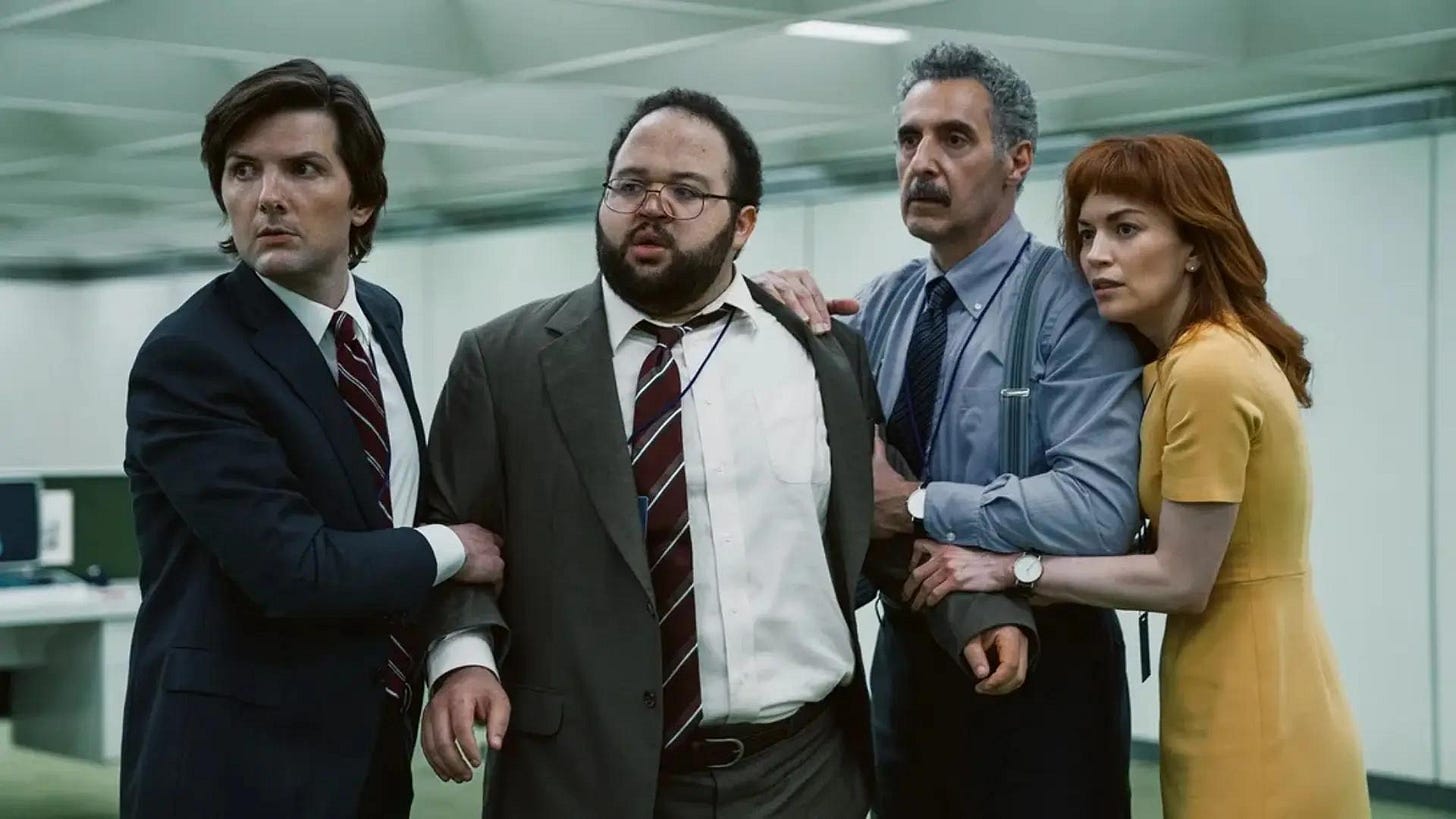In Severance, Work is a Prison
Your job makes you unfree.
Rating: 8.5/10
If freedom means having control over your own life, then most of us are profoundly unfree at the very least from 9 to 5 weekdays. Workers give up the right to set their own schedule; they give up the right to decide where and how to spend their time; they even give up the right for the most part to say what they think. Supposedly, it’s all worth it because you get paid to let someone else tell you when you can eat and which websites you’re allowed to visit, and because you chose to trade the bulk of your precious hours on earth for a bag of groceries and, if you’re lucky, the occasional motor vehicle. But even if you “freely” decided to discard your freedom, you’re still not exactly free.
The new Apple TV+ show Severance is a strikingly thoughtful meditation on the way that work functions as a prison. Created by Dan Erickson and directed by Ben Stiller and Aoife Mcardle, the nine-episode thriller is set in a Black Mirror-esque near future. Lumon Industries has made great strides in brain memory research. They’ve used their tech for workplace security via a “severance” process. People who work in sensitive jobs at Lumon are essentially split into two different people, one of whom has all the memories of their time outside work (such as childhoods, families, relationships) and one of whom remembers…well, only work. The office is the only place they really live.
For the “outies,” who can’t remember and don’t have to worry about work, the severance process can have a number of benefits. Mark (Adam Scott) lost his wife in a car accident; the grief left him unable to work at his college teaching job. Erasing his memories allows him to make money and to literally forget his troubles for a while.
For the “innies,” though, the severance process cuts them off not just from the past, but from free will, and from any meaningful future. For them, they are always at the office, since they turn into their outie selves as soon as they step out the door and only return to themselves when they come back. They can’t ever spend the money they earn; that’s all done by their other selves. They can’t communicate with their other selves except in strictly regulated ways—and when they do, they often wish they hadn’t.
So the innies mostly sit in one room doing apparently meaningless computer tasks, occasionally receiving minor rewards (finger traps; a melon plate) for good productivity numbers. When they do something the powers that be deem a violation, they are sent to the Break Room, where they are tortured by being forced to recite a kind of corporate plea for forgiveness over and over until a machine says they mean it. When they are especially good, the boss (Patricia Arquette) sends them to talk to therapist Mrs. Casey (Dichen Lachman). She tells them in bland generalities that their outies are great people (courageous, nice smiles, good at sex) and that they should be proud.
This isn’t the first show to satirize businessspeak and the cutthroat despair of cubicle culture. But Severance goes beyond even The Office in capturing the metaphysical despair of being alienated from your own labor. The Lumon offices are a blank vista; long windowless white corridors, an island of computers stranded in an empty room.
Different workers react to the trauma of imprisonment and meaninglessness in various ways; Dylan (Zach Cherry) boasts about how many useless toys his productivity has earned him. Irving (John Turturro) becomes obsessed with the quasi-mystical proclamations in the employee handbook and reprimands his coworkers for infringements. New hire Helly (Britt Lower) spirals into rage, despair, and self-harm. Their bosses condescend to them remorselessly and they have little choice but to react like powerless children, alternately currying favor or flouting petty rules with a mix of petulance and fear. They aren’t allowed to read. They aren’t allowed to speak with workers in other departments. They are policed, terrorized, bullied. In short, they’re workers.
Crafting a plot that can live up to the brilliance of the concept is a tall order, and Severance isn’t always quite up to it. Mark’s life on the outside takes up a lot of screentime but isn’t that engrossing. He starts to realize that something is wrong at Lumon and to investigate. But the cloak and dagger machinations feel pedestrian compared to the uniquely imagined and queasily resonant goings on in the office—not least an unexpected and deftly handled office romance.
As the walls between work and home start to crack, though, the show pulls off some remarkable twists. There’s a wonderfully funny exploration of how self-help rhetoric can be numbingly banal or explosively liberatory depending on context. Mark’s brother-in-law writes inspirational books which Mark outside despises. But Mark inside has a different reaction when he reads, “Your so-called boss may own the clock that taunts you from the wall, but my friend the hour is yours.”
The last episode is a cascade of cliffhangers and of escapes almost, almost achieved. It is wonderfully constructed, and I’m not sure how you could see it without wanting more. If we don’t get a season two, I will be cross. Help keep the severed alive by checking out the show—preferably on the job, while you aren’t supposed to be free to do so.
First published January 2022.



Workers but also subjects of operant conditioning, imo. I wrote about this and would love your thoughts on it? https://open.substack.com/pub/amyletter/p/the-grim-barbarity-of-punish-and?r=88zn9&utm_campaign=post&utm_medium=web